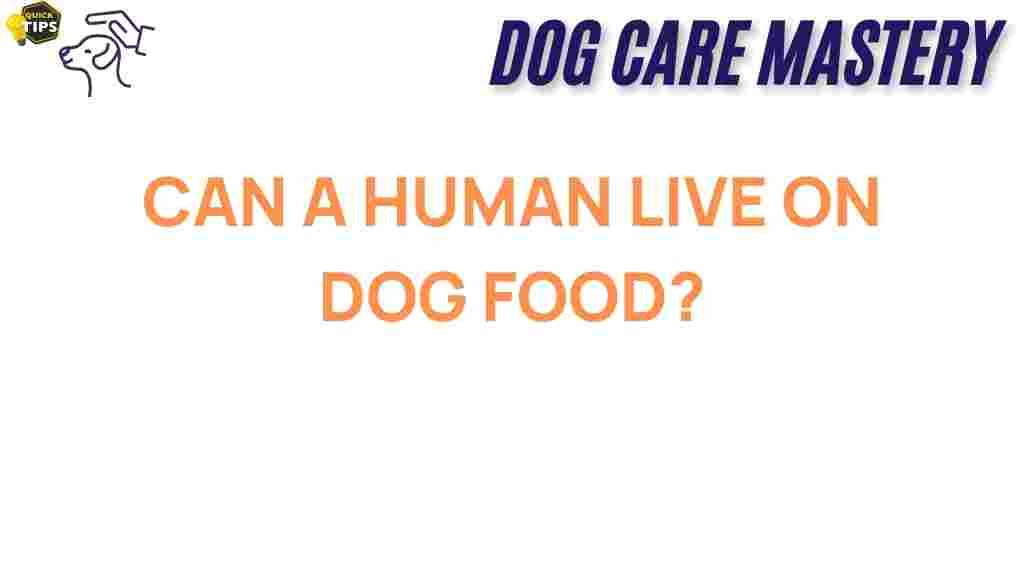Can the Canine Diet Sustain Human Life? Exploring the Controversy of Dog Food
The question of whether the canine diet can sustain human life has sparked considerable debate among pet owners, nutritionists, and veterinarians alike. As more people seek to simplify their diets or experiment with unconventional food sources, the idea of consuming dog food has become increasingly popular. However, before one considers making such a drastic dietary change, it’s essential to explore the nutritional value of dog food, its potential health implications, and the controversies surrounding this topic.
The Nutritional Composition of Dog Food
Understanding the ingredients and nutritional composition of dog food is crucial to assessing its suitability for human consumption. Dog food is formulated to meet the dietary needs of canines, which differ significantly from those of humans. Here are some key components typically found in dog food:
- Proteins: Dog food often contains meat, fish, or plant-based proteins to provide essential amino acids.
- Carbohydrates: Ingredients like rice, corn, and potatoes serve as energy sources.
- Fats: Healthy fats from sources like chicken fat or fish oil contribute to energy and support skin and coat health.
- Vitamins and Minerals: Dog food is fortified with vitamins and minerals to support canine health, including calcium, phosphorus, and various B vitamins.
Can Humans Thrive on Dog Food?
While dog food is designed to meet the needs of dogs, humans have different nutritional requirements. Here’s a breakdown of the reasons why dog food may not be suitable for long-term human consumption:
- Amino Acid Profile: Dog food may lack certain essential amino acids that humans need, such as taurine and arginine.
- Vitamin A Toxicity: Many dog foods contain high levels of vitamin A, which can be toxic to humans if consumed in large quantities.
- Fiber Content: The high fiber content in dog food may cause digestive issues for humans, leading to bloating or discomfort.
Potential Health Risks of Consuming Dog Food
Despite the potential for short-term sustenance, consuming dog food poses various health risks:
- Unbalanced Nutrition: Dog food is not formulated to meet human nutritional standards, leading to deficiencies or excesses over time.
- Contamination Risks: Dog food is not subject to the same food safety regulations as human food, increasing the risk of contamination.
- Allergic Reactions: Ingredients in dog food may trigger allergic reactions in some individuals, especially if they have food sensitivities.
Exploring the Controversy
The idea of consuming dog food raises several questions and concerns:
- Ethical Considerations: Many argue that eating dog food is unethical, as it undermines the bond between humans and pets.
- Cultural Perceptions: In some cultures, the consumption of pet food may be viewed as taboo or inappropriate.
- Marketing and Labeling: The marketing of premium dog foods may lead consumers to believe that these products could be safe for human consumption.
Possible Scenarios for Dog Food Consumption
While it’s generally not advisable for humans to rely on dog food as a primary food source, there are specific scenarios where it might be considered:
- Emergency Situations: In cases of extreme food shortages, dog food could serve as a temporary solution.
- Testing Tolerance: Some adventurous individuals may try small amounts of dog food to test their tolerance.
How to Approach the Idea of Eating Dog Food
If someone is curious about trying dog food, it’s essential to approach the idea with caution:
- Consult a Professional: Speak with a nutritionist or dietitian before making any dietary changes.
- Choose Quality Brands: If you decide to try dog food, choose high-quality, human-grade options that are free from harmful ingredients.
- Start Small: If you want to experiment, start with small amounts and monitor your body’s response.
- Stay Informed: Keep up with research and discussions around the topic to understand any new findings.
Internal and External Perspectives
For those interested in exploring alternative diets, consider reading more about the benefits of plant-based diets. Additionally, consulting with a veterinarian may provide insights into the nutritional needs of dogs and how they differ from humans.
Troubleshooting Common Concerns
If you’ve tried dog food and experienced discomfort or other issues, here are some troubleshooting tips:
- Monitor Symptoms: Keep a journal of any symptoms you experience after consumption.
- Hydrate: Ensure you drink plenty of water to help with digestion.
- Consult a Doctor: If symptoms persist, seek medical advice promptly.
Conclusion
While the curiosity surrounding the consumption of dog food is understandable, it is crucial to recognize that dog food is specifically formulated for canine nutrition and not for humans. The potential health risks, ethical concerns, and nutritional imbalances make it an unsuitable choice for long-term human sustenance. If you find yourself in a situation where dog food is the only option, consult professionals and approach the consumption with caution. Ultimately, maintaining a balanced and diverse diet is the best way to support human health. For more information on dietary choices, you can explore resources like the USDA’s dietary guidelines.
This article is in the category Nutrition and created by dogcaremastery Team
